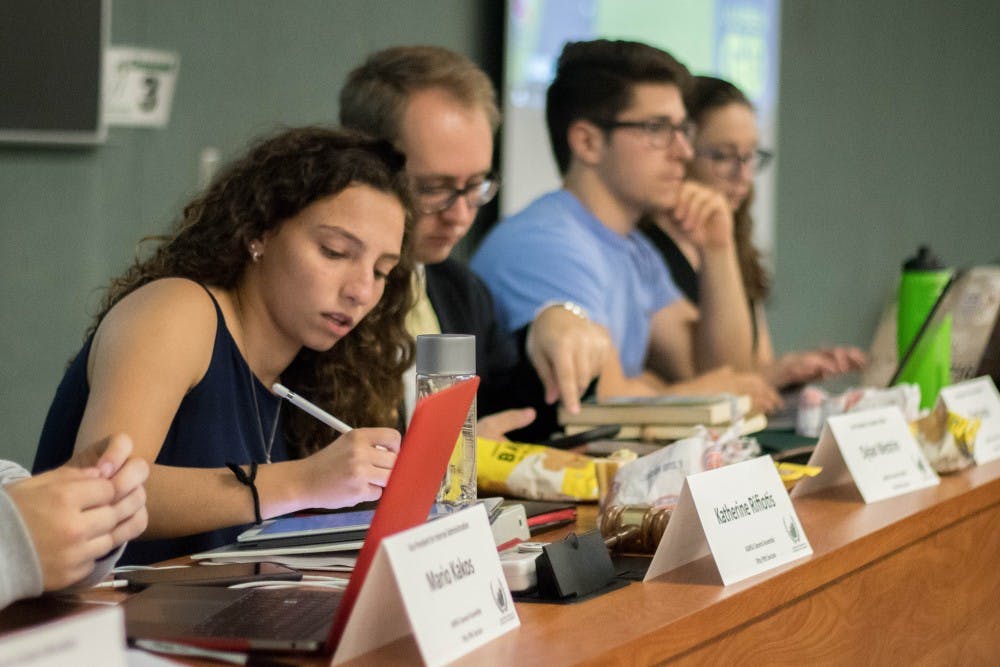The Associated Students of Michigan State University, or ASMSU, held its first committee meetings of the semester on Jan. 10.
The committees discussed MSU's new tuition model and a program that trains college women to run for student government and elected a new finance committee chair.
Here are three takeaways from the meetings.
Taking action on block tuition
The academic committee passed a bill regarding block tuition, the newly implemented tuition structure at MSU.
Block tuition is a model that requires undergraduate students taking between 12 and 18 credit hours to pay a flat rate for tuition, equal to that of 15 credits.
Policy Committee Chair Isaiah Hawkins, who introduced the bill, explained that it's not asking to get rid of block tuition. Instead, it's asking the administration to offer waivers to upperclassmen who may have planned their degrees out before the block tuition model was implemented.
“A lot of students planned their degrees out, especially in harder majors, so that they could be taking 18 credits early on so that they’d get to their junior and senior year and be able to have lighter course loads," Hawkins said. "Some people use that to be able to work, to look for internships, to get ready for grad school and that kind of thing, so we are really asking for those students to be able to be exempt from block tuition because they won’t be able to reap the benefits."
However, Hawkins addressed that the implementation of block tuition may be beneficial to some, and that is why the waivers would be optional for students to take advantage of through an application process.
“What we are asking is for administration to really allow block tuition to help students and not penalize them for planning their degrees out,” Hawkins said, later adding that the opportunity for waivers would allow students to “take advantage of what best suits their degree.”
Bringing "ElectHer" to campus
A bill allocating $4,000 to bring the "ElectHer" seminar to MSU was passed unanimously by the finance committee.
ElectHer is a program that helps encourage and prepare college women to run for student government on their university campuses. College of Natural Science Representative Katherine Gray introduced the bill, and explained how ElectHer aims to diminish the disparity between the high percentage of women in college and the low percentage of women in their student governments.
Gray attended the program herself last year at MSU and shared this first-hand experience with the committee.
“I found the program to be incredibly useful and honestly when I first went I didn’t think it was going to be. I thought it was going to be very politically focused and although it was, I found that the biggest benefit for me was the focus on public speaking and developing an elevator pitch and really learning how to sell yourself to other people,” Gray said.
“The networking was fantastic, so I thought it was an amazing program. I whole heartedly think it should come back again. We had a great turn out and everybody that went thoroughly enjoyed it.”
The committee held no discussion before passing the bill unanimously.
A new chair of the finance committee
The finance committee elected senior Elizabeth Medlin, a representative from the College of Music, to finance committee chair. She won by an 11 to 2 vote.
Medlin ran against Ryan Aridi and Sergei Kelley — the representatives for College of Engineering and College of Agriculture and Natural Resources — for the position which was formerly run by sophomore Maysa Sitar. Sitar abdicated the position after being elected as the new vice president of governmental affairs at the last meeting.
Support student media!
Please consider donating to The State News and help fund the future of journalism.
Medlin’s speech focused on both the impact and importance of the finance committee’s duties, as well as her goals of promoting media literacy and maintaining open communication within the committee.
“One of the things that I want to do is to facilitate research and media literacy, especially in regards to data collection so that we can write more effective bills that reach more people,” Medlin said. “Another thing that I want to do is to just create a more civil atmosphere for discussion.”
Medlin acknowledged how the committee previously has been successful at debating a variety of topics, and this is something she plans on taking to the next level as finance chair.
“In this last semester, finance committee has done a good job of dealing with complex issues in a very civil manner and I think that is something that we could bring to the whole GA (General Assembly),” Medlin said. “It’s a ground-up culture change and that is not something that is going to be solved by somebody banging on a gavel, its going to be solved by people respecting people."
The first general assembly meeting of the semester will be held on Jan. 17.
Discussion
Share and discuss “Taking action on block tuition, other takeaways from ASMSU meeting” on social media.








